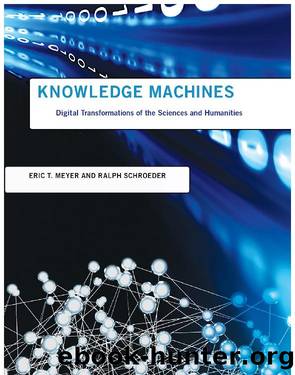Knowledge Machines by Unknown

Author:Unknown
Language: eng
Format: epub
Published: 2021-07-04T16:00:00+00:00
7 Digital Research across the Disciplines: Humanities and Access to Knowledge
The digital humanities as specialist sets of tools and techniques have been around for more than twenty years but became much more prominent around the middle of the first decade of the twenty-first century.1 Since then, there has been growing interest and activity in creating digital humanities projects, in attendance at digital humanities conferences, and in the number of papers and sessions devoted to digital concerns at mainstream humanities conferences.2 In the United Kingdom, the funding agency JISC invested heavily in the digitization of humanities content, funding dozens of projects of varying size since 2004, as has the Arts and Humanities Research Council. The US National Endowment for the Humanities, Canadaâs Social Sciences and Humanities Research Council, the European Union, and a wide variety of public and private funders around the world have been committing money to digitizing the historical documents, cultural materials, and other resources that make up our shared cultural heritage.
Humanities scholars have by and large responded enthusiastically to the availability of digital resources. Consider, for instance, the following reactions from researchers engaging with two popular digital resources:
British History Online is my favourite and first source for primary sources in British history. As a student of history, librarian, and writer, I return again and again. Even when Iâm not researching, I often visit BHO for the sheer fun of what I might learn and discover. The site is easy to navigate, convenient, and its offerings thorough and accessible. Where else online can I find such a bounty of Britainâs heritage? It is a generous endeavour and an absolute goldmine. (qtd. in Blaney and Webster 2010, 7, cited in Meyer 2011, 2)
Iâm not joking but [the University of Oxford podcast site] has become my favourite site in ten seconds flatâcanât stop downloading! Where has this been all my life?????? This is ridiculous! (qtd. in Wilson, Marshall, and Geng 2010, 7, cited in Meyer 2011, 2)
These admittedly hyperbolic reactions are nevertheless consistent with our data about how humanities scholars view the digital resources available to them. In a survey of 426 humanities scholars in 2009, 83 percent of respondents described themselves as either enthusiasts or advocates of digitization in the humanities, and only 3 percent counted themselves as either critics or skeptics (Meyer, Eccles, Thelwall, et al. 2009, 151). In the same study, 98 percent of respondents considered digitized collections to be useful, and 76 percent felt that new questions would require the use of digitized resources. Conversely, only 2 percent felt that the digital approaches threatened to undermine the quality of research in the humanities, and only 5 percent felt that digitization was more hype than reality (152).
Compare this level of enthusiasm to that shown in the social sciences for the tools of e-research, and the popularity is clear: in a survey of 526 social scientists in 2008, only 60 percent considered the digital tools of e-research to be useful, and 59 percent felt that there would be new
Download
This site does not store any files on its server. We only index and link to content provided by other sites. Please contact the content providers to delete copyright contents if any and email us, we'll remove relevant links or contents immediately.
Professional Troublemaker by Luvvie Ajayi Jones(29628)
Whiskey Words & a Shovel I by r.h. Sin(19346)
Rewire Your Anxious Brain by Catherine M. Pittman(18598)
Healthy Aging For Dummies by Brent Agin & Sharon Perkins RN(17022)
Cat's cradle by Kurt Vonnegut(15273)
Talking to Strangers by Malcolm Gladwell(13316)
The Art of Thinking Clearly by Rolf Dobelli(10343)
They Both Die at the End by Adam Silvera(9781)
The 5 Love Languages: The Secret to Love That Lasts by Gary Chapman(9724)
Doing It: Let's Talk About Sex... by Hannah Witton(9254)
The Compound Effect by Darren Hardy(8885)
Thirteen Reasons Why by Jay Asher(8856)
Goodbye, Things by Fumio Sasaki(8538)
Wonder by R.J. Palacio(8525)
Tools of Titans by Timothy Ferriss(8322)
Atomic Habits: Tiny Changes, Remarkable Results by James Clear(8266)
Becoming Supernatural by Dr. Joe Dispenza(8174)
Wonder by R. J. Palacio(8068)
Change Your Questions, Change Your Life by Marilee Adams(7697)
